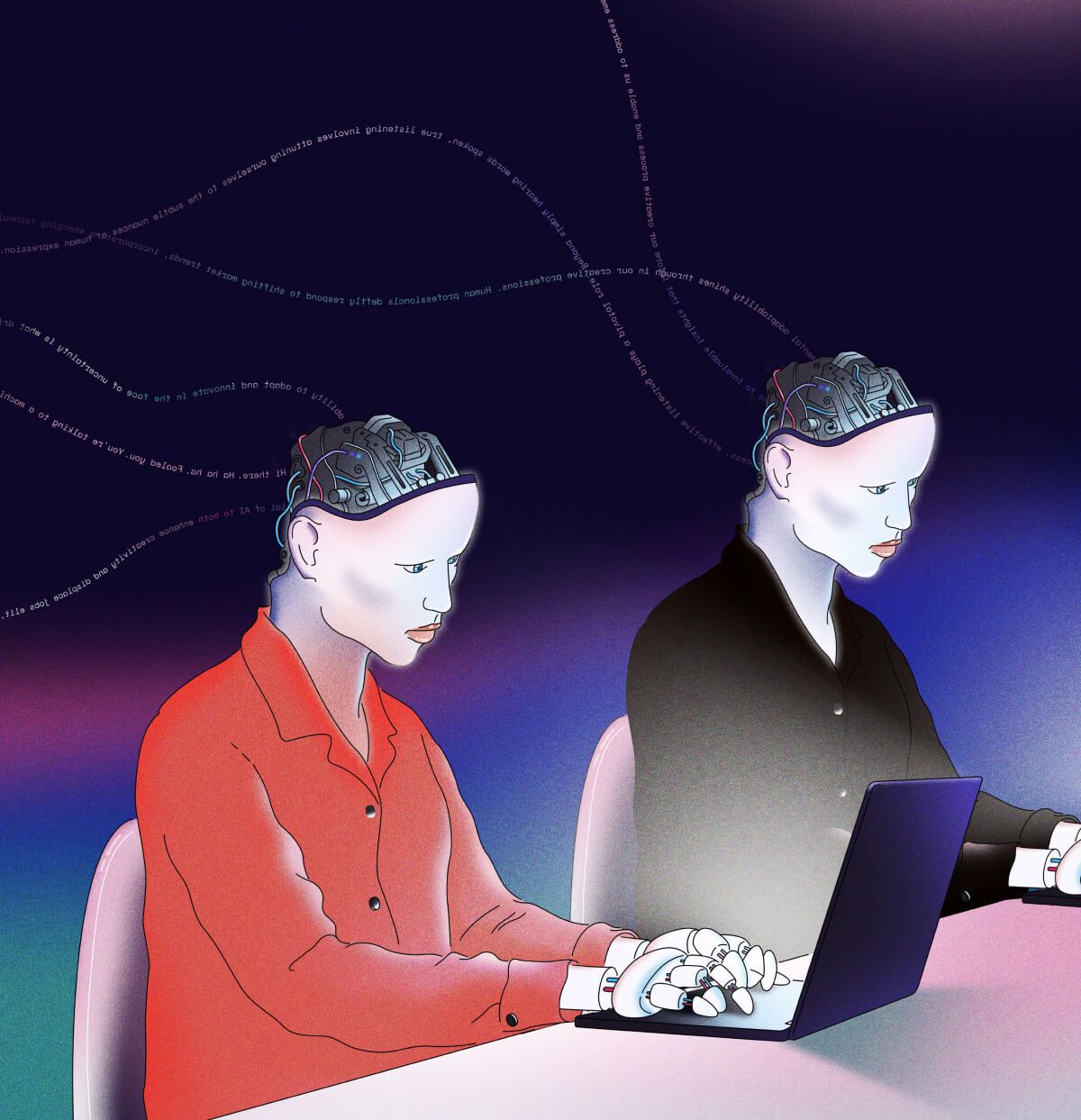
Gainingperspective onthe prompt
"Hi there. Ha ha ha. Fooled you. You're talking to a machine, but don't be shy, it's OK. Machines need love too, so talk to it." This line from The Terminator, in which an AI-controlled cyborg is sent back in time from a post-apocalyptic 2029 to 1984, captures a sentiment that's becoming increasingly relevant today. As technology advances and AI becomes more integrated into our lives, machines needing love—or at least understanding—take on a new meaning. In the creative industries, the portrayal of generative AI often tends towards the fantastical as media narratives sensationalise AI's potential, depicting a future where algorithms rule supreme, much like The Terminator's 2029.
The media narrative is not a new one, throughout history new technologies have been hailed as detrimental to society, only to prove themselves catalysts for progress. The printing press was feared for its potential to spread heretical ideas and undermine social order, yet ultimately democratised access to knowledge and fueled the Renaissance. Similarly, the internet was met with skepticism and concerns about privacy and information overload, but as we all know it has revolutionized communication, commerce, and access to information in ways that were unimaginable just a few decades ago. And let’s not even begin to talk about the digital camera or the rise of PhotoShop… The ability to adapt and innovate in the face of uncertainty is deeply human. Anthropological and archaeological evidence showcases this remarkable ability to adapt and thrive in diverse environments. Early human societies adapted their hunting and gathering strategies, shifted settlement patterns, and developed new tools and technologies to survive environmental challenges. The archaeological record is overflowing with examples of human ingenuity and resilience, from the agricultural innovations of the Neolithic revolution to the transformative impacts of the Industrial revolution. We see ancient civilizations adapting their artistic expressions to reflect changing cultural norms, technological advancements, and social structures. From the intricate cave paintings of early humans to the monumental architecture of ancient civilizations, creativity has always been intertwined with adaptability, evolving alongside human societies. As we delve into the innovation and adaptation, envisioning possibilities beyond the present reality becomes imperative. Our ability to envision future scenarios, anticipate trends, and creatively problem-solve rests upon our capacity for imagination. It's not merely about reacting to current challenges (or prompts…) but also about envisioning potential avenues for change, growth, and transformation. "The uncertainty surrounding job transitions in the wake of AI advancements prompts reflections on historical shifts and their societal repercussions." – Jonas Norberg, Head of Artificial Intelligence at Tuned Global
In this dynamic process, effective listening plays a pivotal role. Beyond simply hearing words spoken, true listening involves attuning ourselves to the subtle nuances of human expression. It's about actively engaging with our customers, colleagues, and stakeholders to discern not only what is being said but also what remains unspoken—the desires, concerns, and aspirations that linger beneath the surface. By deepening our listening skills, we gain access to invaluable insights that inform our creative process and enable us to address emerging challenges proactively. This emotional intelligence allows humans to understand and interpret complex sentiments, forging deeper connections with audiences. From the subtle nuances of a piece of music to the heartfelt storytelling in a marketing campaign, it's the human touch that resonates with people on a profound level. And while AI may excel at processing data and identifying patterns, humans can think outside the box, drawing on intuition and experience to come up with innovative, and unexpected, solutions to complex challenges. "Comparisons to historical events underscore the potential societal implications of rapid job displacement due to AI. Diverse professional reactions to AI's impact highlight the varied responses and challenges faced within different sectors. An awareness of the broader societal implications of AI-induced job displacement is crucial for navigating the evolving technological landscape responsibly." – Jonas Norberg, Head of Artificial Intelligence at Tuned Global
As long as AI tools remain in, many ways, passive listeners awaiting the creative commands from the human, creative overlords while being limited by cultural, political, and ethical constraints, let us adopt a level-headed approach to this latest human technological innovation. AI's integration into creative work is not about AI replacing humans; it's about collaboration. AI might be good at streamlining tasks and boosting efficiency, but human ingenuity drives creativity, emotion, and strategic thinking. And, while AI offers transformative potential, human professionals remain indispensable as they bring a level of emotional intelligence, creativity, and critical thinking that AI simply can't match or replicate. So, instead of undermining social order, perhaps this latest human innovation can, yet again, further democratise access to knowledge and revolutionise communication, commerce, and access to information for our day and age.

